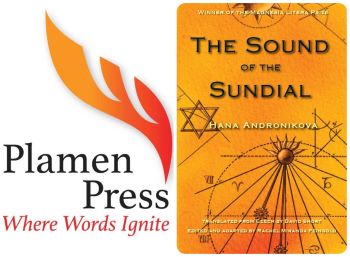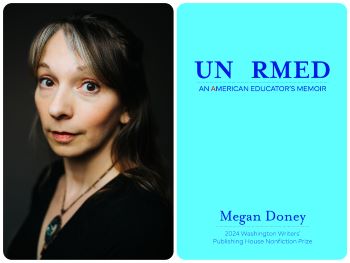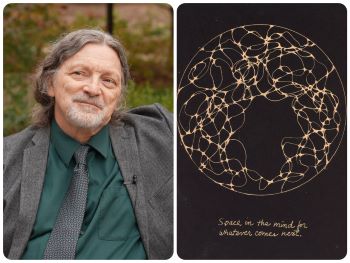How Plamen Press is helping U.S. readers discover Eastern European works.

I must be a contrarian. It’s summer — a time of beach reads and streaming rom-coms. Instead of kicking back in this oppressive July heat, I dove into Timothy Snyder’s Bloodlands, which dissects an Eastern Europe caught between Hitler and Stalin, and The Sound of the Sundial by Hana Andronikova, an award-winning novel from Plamen Press. This independent press, based in Washington, DC, was founded in 2013 by Roman Kostovski and Rachel Miranda Feingold and specializes in English translations of literature from Central, Eastern, and Southeastern Europe.
Why am I drawn to the dark side when the sun shines bright? To World War II history or, in the case of The Sound of the Sundial, an historical novel that also thrusts me into the bloodiest, most murderous of times and leaves my psyche wiser but battered with emotions and ideas? Since this is a column about small presses, I will focus on Plamen Press and leave my swirl of Kafkian analysis to the side.
The Sound of the Sundial was a magnetic read. This novel drew me into the lives of a German-Czech engineer, Thomas, his Jewish wife, Rachel, and their children as it seamlessly traversed time and place with exquisite details. It’s a love story. From the mountains of Colorado in the 1980s back to a small village outside Prague in 1926, and with further interweaving flashbacks to Calcutta and back again to the infamous concentration camps at Theresienstadt and Auschwitz, and then to postwar despairs and hopes, I explored worlds with this book. Translated from the Czech by David Short and edited and adapted by Feingold, I highly recommend it in any season for its absorbing story and deft craft.
I met the driven polymath Kostovski at a recent Alan Cheuse International Writers/Writer’s Center launch event for Andronikova’s second book, Heaven Has No Ground, and followed up a few weeks later with several questions.
Your books seem to speak to the political as well as the personal. Is that a fair assessment?
That’s an interesting question. As an independent press and a nonprofit, we try not to be political ourselves, but many of our writers explore themes that are based in political events and naturally lead to political discourse. Every writer and poet we have published has lived through some form of totalitarianism, and their writing reflects that experience. Viktor Dyk’s The Ratcatcher emphasizes individualism. Vitĕzslav Nezval, in Farewell and a Handkerchief, carries an anti-war and anti-fascist message in many of the poems in his book. Martin Vopĕnka, in The Back of Beyond, has great retrospective insight into living under communism that he reveals while trying to create a connection with his 8-year-old son, who has never experienced totalitarianism. This is just a sliver of the themes these writers capture.
When you’re promoting writers from regions that have historically experienced multiple dynamic geopolitical transitions, it’s a given that they will explore ideas that can trigger political and philosophical debate. It’s unavoidable. That is what makes them unique and interesting. In Danuta Hinc’s When We Were Twins, the theme doesn’t project a political but rather a humanist stance. It asks the thorny question of what leads a person who isn’t born evil from the start to commit an evil act. It explores the distance between historical experience and personal choices. Such themes need to be addressed.
Our goal as a press is not to be political but to offer a platform for writers with these unique perspectives and experiences who can present them to our readers in the form of poetry or prose. They are meant to leave readers thinking.
How do you choose what books to translate and publish? And how many do you publish annually?
We choose our books based on literary merit and the quality of the translation. We’re sort of a unique team. Between our managing editor, Rachel Miranda, and myself, we can read original literary works in 13 languages and compare them to the translations. I have 30 years of experience in literary translation from Slavic languages. We also follow what is going on in the literary world in Central, Eastern, and Southeastern Europe. We read books in their original languages, and if [one] catches our eye, we try to get the rights. We do not have a submission period. We publish two to four books a year, but we are working on increasing that number.
I often think of works in translation like classical music — I like a symphony on occasion, but it’s so much easier to just listen to my Broadway tunes. So, my question: Why do you think Americans tend to read fewer works in translation than other literary works?
A translated book doesn’t have to carry that element of sophistication that characterizes classical music. Translated literature can have the sophistication of the New World Symphony “Largo” or the simplicity of the folk song “The Mockingbird,” on which Dvořák’s “Largo” is based. Both are pleasing to the ear. In the past, only the “great novels” were translated into English, so I can see how we tend to believe that a novel translated into English must require a more sophisticated reader. And yet we have modern translations such as Stieg Larsson’s The Girl with the Dragon Tattoo, a great detective novel that doesn’t go as deep into the human psyche as Dostoyevsky’s Crime and Punishment, but it is still a good read. Americans are readers, and they are hungry for good stories. They are among the highest buyers of books in the world. Yet, the translations account on average for 3 percent of the literature published per year in the U.S. In the Czech Republic and Slovakia, it is 37 percent. But I don’t think it’s American readers who determine this small percentage.
First and foremost, it has to do with the limited perspective of the mainstream publishing market. In the U.S., major publishers are focused on promoting national literature, and, with a few exceptions, they have been historically hesitant to take a risk on any unknown writers, and this certainly includes international writers unknown to the English-speaking world. Beyond that, if a novel did get translated and published, the publishers often didn’t feature the translator’s name on the book cover out of fear that it would dissuade readers from buying the book. There is simply little effort among major publishers to promote translated literature, especially from small countries. So, it’s up to small publishing houses like ours to do the job.
The quality of translations has also improved over time. Organizations such as ALTA (American Literary Translators Association) and local DC ALT (DC Area Literary Translators Network) have provided platforms for the development of literary translation. There are better translators out there. As a press, we try to break the cycle of snubbing translators in the publishing process. We want to promote not only the writers but also the translators of our books because a good translation is a work of art in itself. We feature our translators on the cover of our books, and we offer higher royalties to our translators than most publishers.
With The Sound of the Sundial, you published Hana Andronikova posthumously. What drew you to this novel? Was it particularly challenging as a small, independent press to navigate the publishing process?
Hana Andronikova was a beloved and celebrated Czech writer, and Plamen Press publishes both The Sound of the Sundial and Heaven Has No Ground, the only two novels she wrote before dying of breast cancer [in 2011] at the age of 44. The Sound of the Sundial captured us immediately. The story was great! It spans from the beginning of the 20th century to shortly after the Velvet Revolution. One of the main characters, Daniel, is loosely based on the childhood story of Tom Stoppard.
In Hana’s unforgettable and unique writing style, the book soars, placing it on a par with such war romances as A Farewell to Arms or Doctor Zhivago, and it won the inaugural Magnesia Litera award in the Czech Republic for best debut. I couldn’t believe we got the rights to it. It was our second publication. I was lucky enough to have met our managing editor, Rachel Miranda, who dove into the book and carefully edited the two conflicting translations we had to work with — the precise rendition by David Short and the more colorful and loose version Hana worked on herself with her partner, Ian Miller. After publishing it, we committed to translating and publishing Hana’s second novel, Heaven Has No Ground, which is a completely different book, an autobiographical novel that deals with Hana’s journey to a number of spiritual centers around the world as she battles with cancer.
To answer the second part of your question, yes, it is challenging to navigate through the publication process. We started this enterprise with very little experience. On a working level, our press is based on the tradition of Samizdat, a movement in communist countries to publish books that were banned by authorities. People would volunteer to type entire manuscripts on carbon copies, and those were put together into books that were then passed around from one hand to another. It was a form of resistance to the regime.
We do not face an authoritarian regime, but we do face a highly competitive and well-established market that is difficult to maneuver and does not favor our type of literature. When I got the idea to start Plamen Press, I had been translating books for several years, and I was frustrated with publishing houses’ lack of interest in literature from Central, Eastern, and Southeastern Europe.
The first book we published was The Ratcatcher by Viktor Dyk, which was already in the public domain; it is a Czech classic that has been translated into many languages but never into English. It was the perfect book to start off with.
We have come a long way since then: We have published 13 books and one album of poet-bard songs. We have mastered the skill of creating books. We have a great team who make our books beautiful not only in terms of content but also visually, with artists like Serena Feingold, Walter Carlton, and Igor Angelov. Our greatest challenge remains breaking into the market, but we have gained traction with several of our books, and we are building up a following through social media. Every year, we expand our audience. It’s an uphill battle, but we are well equipped to continue [on] this road.
What’s next for Plamen Press?
We have several areas where we want to focus our operations. We are planning to continue publishing translated literature from Central, Eastern, and Southeastern Europe, but we are also working on making DC a center for literature in translation. New York is very much focused on national literature that was written and produced in the U.S. The greater DC area has a population that is hungry for international literature.
We are working on expanding our sphere by publishing books translated by translators who reside in the greater Washington, DC, area. Our next two publications will be People and Trees by Azerbaijani writer Akram Aylisli, translated by Katherine E. Young, and Miniatures by Danish poet Carsten René Nielsen, translated by David Keplinger. While these works might not fall strictly into our geographical sphere of interest, Keplinger and Young are local translators whose work we want to support as part of our mission to grow and nurture the DC-area literary-translation community.
Caroline Bock writes stories — from micros to novels. She is the author of the novel The Other Beautiful People, forthcoming from Regal House Publishing in summer 2026. A graduate of Syracuse University, she studied creative writing with Raymond Carver and poetry with Jack Gilbert and Tess Gallagher. In 2011, after a 20-year career as a cable television executive, she earned an MFA in fiction from the City College of New York. She has short fiction forthcoming in the Hopkins Review. She is the co-president and prose editor at the Washington Writers’ Publishing House. She lives in Maryland with her family.

